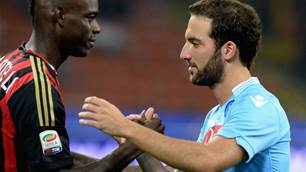Working 24/7, forever on the phone, globetrotting across the atlas and often pushing footballing laws to the absolute limit, a quiet man with a notebook is to thank for many of your team’s players.
It's a common sight on England's Merseyside. A vast playing field with a sea of youngsters competing ferociously in numerous six-a-side matches, their parents looking on with a ¬mixture of pride and anxiety. The sunshine means Martin Waldron is hiding behind designer sunglasses, but his Everton FC training top is clear for all to see. "Are you an Everton scout?" two eight-year-olds ask simultaneously. "Yep," replies Waldron and one youngster chokes on his sherbet dip.
But there's no time for chit-chat. "Summer is a mad time for me," says Waldron. "There are over 200 tournaments throughout the North West this summer. Some weekends I need to mobilise up to 80 scouts because we need every pitch covered. It's seven days a week and I'm never off the phone. My wife is used to it now."
Primarily, there are two types of scouts: player scouts and tactical scouts. But whether it's evaluating the talents of budding young stars, running the rule over potential first-team signings or preparing a dossier on their club's future opponents, there are no shortcuts. Scouting is one of the most labour intensive jobs in football. Multiple matches need to be watched, players assessed, agents, parents and contacts cajoled and reports made.
When it comes to scouting junior players Everton boast one of England's most comprehensive networks. The club have 160 scouts in the North West and in the past few years the policy has paid dividends with the likes of Wayne Rooney, Leon Osman, Tony Hibbert, Jack Rodwell, James Vaughan and Jose Baxter all graduating to the first team.
"When David Moyes joined Everton he said he wanted to have the best young English players around and that's what we've tried to do," says Waldron, who joined Everton in 1995. "Every young player we take on is signed on personally by David Moyes. They get to train with the first team, they get match tickets, we give them the personal treatment and it means our reputation for looking after players is second to none. We have everywhere in the North West covered."
Not all British clubs share Everton's outlook. More and more are opting to scout for players, junior and senior, from overseas. One reason is the dwindling birth rate in the UK that has seen the amount of boys entering reception class drop 23 per cent in recent years. "There used to be four senior schools in Kirkby and now there's two," laments Waldron. "You also get a lot of obese kids playing these days because so many of them are spending their time playing computer games. It's getting harder."
This sentiment isn't shared by all scouts, but Ron Bone, chief scout and head of recruitment at Middlesbrough's Academy, admits he struggles to keep hold of his older players. "With all the hype around football these days there are a lot of very young kids that are passionate about playing, so there's plenty of talent out there," he says. "The problem comes when they turn 16. The distractions of that age start to affect the commitment level of some lads and our junior leagues at that level are very poor."
Bone has made the best of his situation, discovering Stewart Downing, Lee Cattermole and Curtis Fleming among others and overseeing victory in the FA Youth Cup in 2004, but admits his job is getting harder. "At 16, the lads get interested in girls and going to watch the matches with their mates and it seems to have got worse over the past few years."
And that's not all. Rules governing the recruitment of youngsters mean clubs can only take players aged 12 to 16 that live within 90 minutes' travel time of the club's academy (60 minutes for seven to 11-year-olds). Those rules don't apply for foreign youngsters. "There are more foreign coaches these days and they are more likely to recruit foreign players," says Waldron. Sixty per cent of Premier League players are foreign but some academies are also swamped with youngsters from overseas.
After a disastrous World Cup, it seems the value and stock of English players has never been so low. Former England international Kevin Reeves, chief scout with Swansea City before moving with Roberto Martinez to Wigan Athletic last summer, believes the 90-minute rule is one reason why clubs are increasingly recruiting young players from abroad - but says finance is also key. "It all comes down to money," says Reeves. "When I was chief scout at Swansea we found a player called Angel Rangel. He was playing in the Spanish Third Division and we paid £10,000 ($16,000) for him. You can't find that kind of value for money in the UK."
For size and global reach, few clubs can match Arsenal's scouting network. When Arsene Wenger arrived in 1996 he brought an extensive set of overseas contacts that he's fully exploited. "It's like a big pyramid," explains Philippe Auclair, L'Equipe's London-based correspondent. "At the top is Arsene. Below him is chief scout Steve Rowley and below him are the so-called ‘super scouts' who cover all the main football regions: Francis Cagigao (Spain and Portugal), Gilles Grimandi (France, Israel and Africa), Peter Clarke (Holland), Danny Karbassiyoon (USA and Mexico) and Tony Banfield (Italy, Croatia and Slovenia). Below them are layers and layers of other scouts in every country. Many work on a freelance basis and work for various different clubs."
Some companies even provide scouting services on an ad hoc basis. The Scouting Network has 30 scouts in the UK and 25 overseas, all available to scout a team or a player for a fee. Scout7 is a live database that uses 30 researchers across the world to monitor nearly 70,000 players in 127 countries, and can boast Chelsea, Sevilla and Ajax among its clients. As the economic climate in football gets tougher these kind of auxiliary services grow in demand.
Last year, Chelsea sacked 15 scouts in an attempt to streamline operations and the further down the ladder you go, the less formal scouting networks become.
Related Articles

Del Piero on that Liverpool offer

Inside the mind of El Shaarawy













